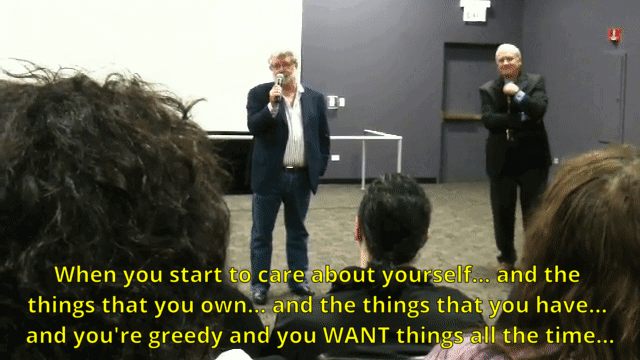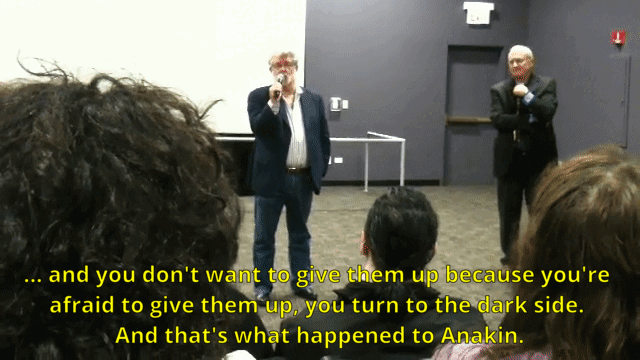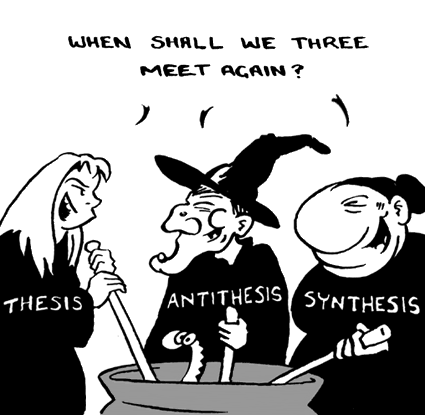yotsuya said:
Us old farts knew Senator Palpatine was Darth Sideous when we saw him in his first scene. Young kids had no idea. The entire PT is written that way.
No, it’s written so it’s obvious he’s the Sith Lord. Why do you think him trying to egg Padme on is so on-the-nose? Him ordering Anakin to kill Dooku? Or the opera scene in Revenge of the Sith? There’s no attempt as a disguise of his voice or anything? It’s obvious on purpose. This is because Palpatine being evil is used to create tension. You’re supposed to know that something’s up with him. Most of the time it’s much better filmmaking to use tension then a surprise. Surprise can be great, but most of the time it’s way better to ring out the tension. It’s like Alfred Hitchcock’s famous quote. It lasts longer, it sticks with you more, it keeps you on the edge of your seat for longer.
https://scifi.stackexchange.com/questions/79673/in-the-prequel-trilogy-are-we-the-audience-intended-to-know-palpatines-true
The blurb on the back of the DVD cover certainly suggests that it wasn’t a big secret…
“Obi-Wan Kenobi, the wise old Jedi from the original series, is a determined young apprentice and Palpatine, well known as the evil Emperor, is an ambitious Senator in the Galactic Republic…”
When Palpatine reveals himself as a Sith in ROTS, it’s not even made to feel like a big of a reveal to the audience. It’s nothing like Vader revealing himself to be Luke’s father, which is obviously written as a big reveal from the way the scene slowly crescendos to the famous line to the huge bombastic music afterwards. Palpatine’s revealing he’s a Sith is nothing like that. There’s no big “gotcha!” moment. It’s made to be like a reveal to Anakin, not the audience.
And there is much more. Or else why as adults do we still love these films. His story telling is genius because it has layers for every audience. A five year old can watch it and love the gadgets and ships. A ten year old can love it because the story is incredible. An adult can love it because the story rings so true at every level.
12 year old’s are very good at digesting the intended story of Star Wars. He literally says he made the films to teach 12 year old’s lessons.
"The original film was designed to allow young people to think outside the box. It was designed for 12-year-olds, adolescents, kids who were starting to think outside the box anyway, as a way of saying, “Let your fantasies run free, because this is the time to do it.” That was one of the original purposes of “Star Wars.”
-Boston.com, 2005
That’s why George Lucas uses his knowledge of avant-grade cinema to make all of his films very visual in their storytelling; it appeals to our primal reactions.
When Darth Vader first walks in the door in A New Hope, you know he’s the powerful evil dark lord of the Sith all because of the visuals. You see the imposing man with the black costume, the scary mask and the huge cape and immediately go, “He’s evil, he’s in charge, he’s super powerful, what a badass”. The same with Darth Maul in The Phantom Menace. You look at him and go, “Shit he looks like a Demon.” It’s why Mustafar blatantly looks like Hell. It’s why Sidious groans like a demon while Knighting Darth Vader (because Sidious is the Devil). It’s why the Jedi Temple looks like a religious place of worship.
“The one exception to Coruscant’s predominant art deco style is the Jedi Temple. Lucas wanted the place where the Jedi to have a sacredness to it, as well as a daunting dose of grandeur. As a result, the Jedi complex is a bit Gothic, a bit pyramidal, and a but Chinese Forbidden City.”
-Jonathan Bresman, The Art of Star Wars: Episode I, 1999
"In contrast to the corporate coldness of the senate building, the Jedi Council architecture was designed to suggest a place of worship, a place that was both religious and monumental. For reference, Chiang took pictures of monuments from various cultures, then exaggerated their shapes and heights in his drawings.”
-Laurent Bouzereau & Jody Duncan, The Making of Star Wars: Episode I, 1999
“The symbol of good in the galaxy, the sacred Jedi Temple is a hybrid of Gothic, art deco, and ancient Chinese and Egyptian architecture. […] Inspired by the TransAmerica pyramid and the rest of the San Francisco skyline, Chiang and Natividad designed the temple complex to be distinctly different than the rest of Coruscant.”
-Jonathan Bresman, The Art of Star Wars: Episode I, 1999
(nothing about an “ivory tower” here like the Star Wars fanbase likes to claim it’s meant to be interpreted as)
The movies are meant to be visually obvious. As is the dialogue, which is why Lucas writes the dialogue in such a flat, utilitarian, and blatant way.
Also you seem to be underestimating how smart a 12-year-old can be.
And frankly I think that you ignoring what is clearly in the films is ignoring some of Lucas’s brilliance as a storyteller.
I literally addressed everything you said. I think George Lucas is brilliant too in terms of his ideas (but not as a writer). And so does David-Talks-SW. You’re just coming away with the wrong stuff.
Also, you seem to think that Filoni made Clone Wars and Rebels in a vacuum away from Lucas.
No, I don’t. In fact I’m one of the few people who actually recognize that The Clone Wars was made by George Lucas. Which is why it fits his vision more then Filoni’s.
This post proves that Filoni doesn’t even entirely understand The Clone Wars (the series everybody says is his own and not George’s?):
https://www.tumblr.com/jedi-order-apologist/698124259656155136/yeah-exactly-theres-a-world-of-difference?source=share
They worked together, with Filoni learning both about the Jedi and about film making from Lucas constantly for nearly a decade. So when Filoni describes Qui-gon’s role and the deeper meaning to the PT, things that are covered the PT and Clone Wars, I don’t think you can blanket state that the publicaly available comments Lucas has made override that level of apprenticeship that Filoni has had.
Except I literally gave you a link to a list of stuff that shows that Filoni interprets the prequels differently from Lucas in multiple different fashions, from The Jedi, to Anakin’s attachments, what they think of the Jedi joining The Clone Wars, and the state of the Republic. How about you actually read the shit I send?
https://www.tumblr.com/jedi-order-apologist/698124259656155136/yeah-exactly-theres-a-world-of-difference?source=share
The Clone Wars does not make Qui-Gon out to be “the only true Jedi Master”. It makes him out to be the guy who discovers force ghosting, which is exactly what he is in the movies. There’s nothing in TCW that implies that Qui-Gon should’ve been Anakin’s master and not Obi-Wan.
This post here describes the true meaning of Qui-Gon’s character:
https://www.tumblr.com/david-talks-sw/695196724085604352/analyzing-qui-gon-jinn?source=share
REBELS, however, has nothing to do with George Lucas. That’s Dave Filoni’s.
Lucas’s other public statements regarding things like when he came up with the PT story, how far back Leia was Luke’s sister, etc. are full of easily disproven information so I don’t tend to take Lucas at his word in interviews. He is selling Star Wars and there is a reason behind everything he says, but it is not always accurate to what he was thinking when he wrote the story or the scripts or directed the film. Often he greatly simplifies what he says and makes it sound like that is the way it has always been.
You can take him at his word because with Leia and Vader it was an attempt to make it seem like he knew everything from the beginning while with the Jedi he’s clearly giving them his own philosophy.
Every lie George has done was for the sake of making it appear like what’s in the prequels was always the story. He lied about Vader always being Luke’s father and Leia always being his sister because he wants people to take the movies he’s making right now as “the true story”. That motivation doesn’t fit lying about the story he’s making at the time. It doesn’t make sense to say he was lying about the intent of the movies he’s making right now when the only reason he lies at all is to make the intent of the movies he’s making right now seem like the intent from the beginning. Come on, man. The motivations are not the same.
Like I said, the idea that George Lucas said the Jedi are the good guys just to appeal to the fanbase is frankly dumb. Lucas doesn’t give a shit what the fanbase says, he’ll praise Jar Jar and call Darth Vader pathetic and say Star Wars is for children (especially 12 year olds) despite how much backlash he’d get. He says what he says and means what he says.
I still think the most hilarious thing about your argument is your actually saying the guy notorious for saying “fuck the fans, fuck Hollywood, I’ll make what I want and say what I want” actually made up a bunch of lies about his films to cater to fans.
So yeah, when I rewatch that interview with Filoni I don’t hear him explaining what he thinks the PT story is. I hear him relaying to us what he learned from Lucas. His explanation of Duel of the Fates fits the name of the track,
It doesn’t fit the fact that Duel of the Fates plays in the battle between Yoda and Sidious which has nothing to do with Anakin. That reasoning for the name does fit with the fact that it was a track made to symbolize the battle between Good and Evil.

These quotes are from John Williams, not George Lucas.
Qui-gon is determined to train Anakin and instead he gets Obi-wan. Instead of a seasoned Master he gets a newbie Knight.
Except if you actually read the shit I send it would prove why Obi-Wan was a great master for Anakin. Anakin’s fall was not Obi-Wan’s fault.
https://www.tumblr.com/david-talks-sw/660316936583905280/how-the-obi-wan-failed-anakin-subplot-was?source=share
Anakin would’ve been a great Jedi Master like Qui-Gon if it weren’t for Palpatine.
Filoni’s interview puts it in words, but his words really ring true.
Literally no. I already sent you a link to a post which proves everything he says wrong.
https://www.tumblr.com/david-talks-sw/678157778408374273/hi-this-came-about-because-ive-seen-a-few-of?source=share
Especially in light of how Qui-gon might have returned in ROTS.
He did return in ROTS, but only to tell Yoda about force ghosting. That was his only planned appearance ever in that film.
But after TPM, it is tracked where Anakin is facing a turning point.
You mean when Yoda and Sidious are fighting?
And it hinges on that duel on Naboo. It turned on who lived and who died.
If you read the stuff I sent you you would know it’s not true.
The notion that Anakin was doomed to fail from the get-go is going against the principle of choice that George was adamant to include in the Prequels. Anakin’s fall was caused by his own choices, not the outcome of some duel that has nothing to do with him. This is Filoni coming up with head canon because he thinks the duel is “boring” if it has nothing to do with Anakin. I know this is head canon because it goes against what John Williams says the track is meant to symbolize and it goes against one of the main themes of the prequels.
Yes, fate/destiny plays a part in Star Wars, but whether you follow it is contingent on your choices. As Lucas puts it:

George Lucas says it hinged on Anakin choosing to kill Palpatine in the office. If there was no Palpatine, Anakin would’ve been just fine. Anakin’s turn was not Obi-Wan’s fault.
So I see no reason to not take Filoni’s desription as 100% accurate. He has always been more literal and forthcoming in interviews where Lucas seems to be forever altering things.
Lucas has not once altered his opinion on the Jedi. Back in the 1980s, 2000s, and nowadays, he still says the Jedi were right and still echoes their philosophy as if it were his own.
You also didn’t address that the Jedi’s philosophy is obviously Lucas’.
https://www.youtube.com/shorts/j690eHY9EAQ
^^^ Here’s George Lucas just recently agreeing with Yoda in ROTS when he tells Anakin he needs to let go of what he fears to lose


^^^ Here’s George Lucas agreeing with the Jedi at a University lecture
SparkySywer said:
I used to be the resident prequel hater here but I think you’re selling the prequels short, brother
I didn’t say the prequels weren’t complex at all though.
I said:
Not that the prequels aren’t complex, but the fact is, “The Jedi are good, the Sith are bad” is a still a bit too black and white for some adults. So they have to make it “You see, Jedi ideology is actually somewhat wrong, they say you can’t ever be afraid or attached to anybody, what assholes!” when that’s not what Jedi ideology is. But people wanna cling on because the idea that the Jedi are morally perfect is boring to them. Adults project flaws onto the Jedi because they can’t relate to morally perfect characters like children can.
People like to cling to the idea that the Jedi were corrupt because it’s makes the prequels more complex then “The Jedi were right, Anakin was wrong.” But that’s not what Lucas is going for. The prequels still have complex themes about democracies and dictatorships, greed, possessive love, war, etc. But it is not, in any way, a critique of the Jedi or a critique of organized religion.




